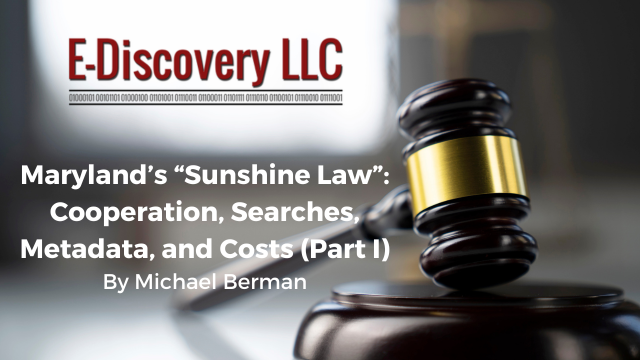
[EDRM Editor’s Note: The opinions and positions are those of Michael Berman. This is the first in a three part series, with Part II here, and the conclusion, Part III here.]
While this blog generally deals with civil discovery, “sunshine laws” that require disclosure of public records by government agencies raise many parallel, and many different, concerns. Maryland’s analog to the federal Freedom of Information Act (“FOIA”) is known as the “Public Information Act,” “PIA,” or “MPIA,” and it is codified as Md. Code Ann., General Provisions Article, §4-101, et seq.
This is Part I of a three-part blog comparing disclosure of public records under the PIA and civil discovery under the Maryland Rules.
THE PURPOSES OF THE PIA AND CIVIL DISCOVERY
While both are disclosure provisions, the purpose of the PIA is “different from that of the discovery rules….” Hammen v. Balt. Co. Police Dept., 373 Md. 440, 454 (2003).
The scope of the two processes differs. The PIA applies to all “public records,” however, a public record that is not relevant to the subject matter of the action is not discoverable in civil litigation. See Md. Rule 2-402(a).
If the cost is disproportionate, or if the record is not reasonably accessible due to undue burden or cost, a document is, absent a court order, not discoverable under that Rule, even if it is a disclosable “public record” under the PIA.
The PIA is a sunshine law. Under the PIA, “all persons” are permitted access to public records. The act has a broad remedial purpose and inspection of requested public records should be permitted with the “least cost and least delay….” Baltimore Police Dep’t v. Open Just. Baltimore, 2023 WL 5616318, at *2 (Md. Aug. 31, 2023).
Under the Maryland discovery rules, only litigants have the right to discovery. The purpose is to eliminate “as far as possible, the necessity of any party to litigation going to trial in a confused or muddled state of mind, concerning the facts that gave rise to the litigation.” Rodriguez v. Clarke, 400 Md. 39, 57 (2007)(cleaned up).
RELATIONSHIP OF THE PIA AND CIVIL DISCOVERY RULES
In Maryland civil lawsuits, litigants are permitted discovery of facts relevant to the subject matter of the action. Md. Rule 2-402(a). However, that Rule does not apply to the PIA. “We hold that, absent a statute to the contrary, the rules of discovery applicable to circuit court proceedings are not, generally, applicable in respect to MPIA proceedings.” Hammen, 373 Md. at 453.
The Maryland Attorney General’s position is: “Just as the PIA does not narrow the scope of discovery, neither does the PIA expand it.” See Attorney General’s PIA Manual at 3-56. A public record that is disclosable under the PIA may not be discoverable in litigation, and vice versa.
On the one hand, a person may obtain through a PIA request public records that are not available through civil discovery in litigation. Hammen, 373 Md. at 440, passim (surveillance video in tort).
On the other hand, the PIA’s exceptions to disclosure do not create a privilege to object to production in civil litigation. Mezu v. Morgan State Univ., 269 F.R.D. 565, 576 (D. Md. 2010); accord Maryland Restorative Just. Initiative v. Hogan,2018 WL 5026369, at *3 (D. Md. Oct. 17, 2018); Monzon-Alvarado v. United States, 2013 WL 6054457, at *2 (D. Md. Nov. 14, 2013); McDonnell v. Hewitt-Angleberger, 2012 WL 6088830, at *2 (D. Md. Dec. 5, 2012); Shriner v. Annapolis City Police Dep’t, 2012 WL 959380, at *3 (D. Md. Mar. 19, 2012).
The scope of the two processes differs. The PIA applies to all “public records,” however, a public record that is not relevant to the subject matter of the action is not discoverable in civil litigation. See Md. Rule 2-402(a). If the cost is disproportionate, or if the record is not reasonably accessible due to undue burden or cost, a document is, absent a court order, not discoverable under that Rule, even if it is a disclosable “public record” under the PIA.
There may be, however, room for discretion that could create some overlap. See generally the Attorney General’s PIA Manual at 3-54, et seq. (“Maryland courts have sometimes held that the fact that a record is exempt from disclosure under the [PIA] is relevant to a record’s discoverability.”). Mezu states that: “At most, [the PIA] could be used as a basis to seek a protective order under Rule 26(c), to ask the Court to impose conditions regarding the production of records within the scope of the MPIA that would adequately address any confidentiality concerns.” Mezu, 269 F.R.D. at 576–77.
[This is the first in a three part series, with Part II here, and the conclusion, Part III here.]


